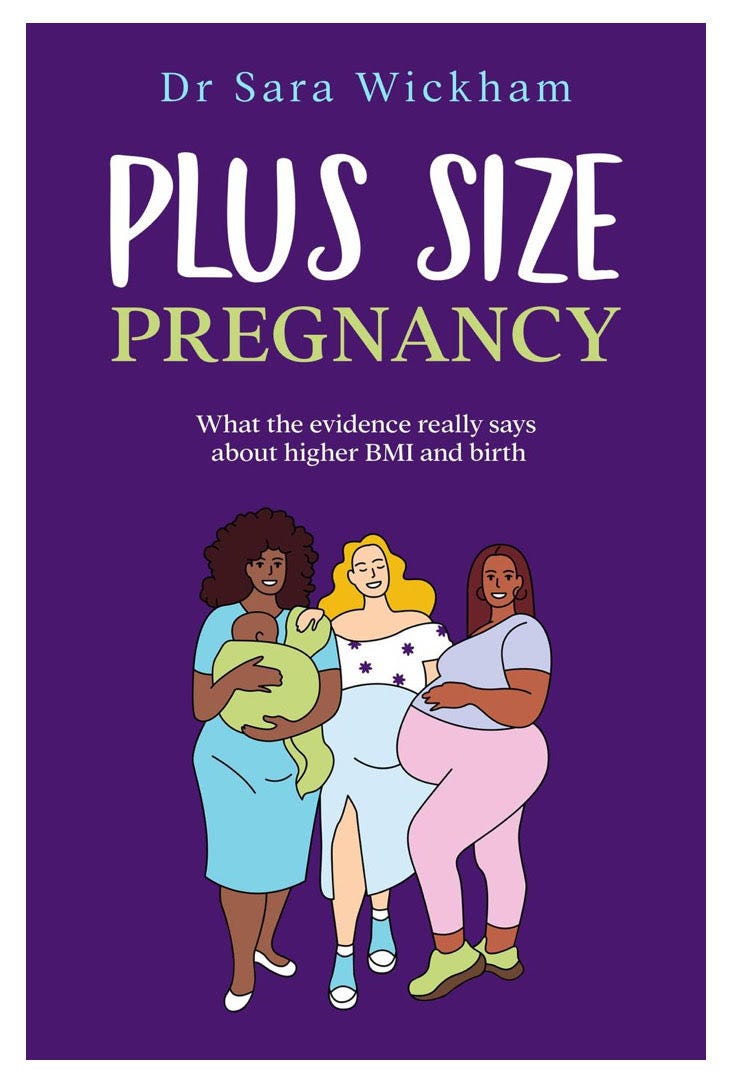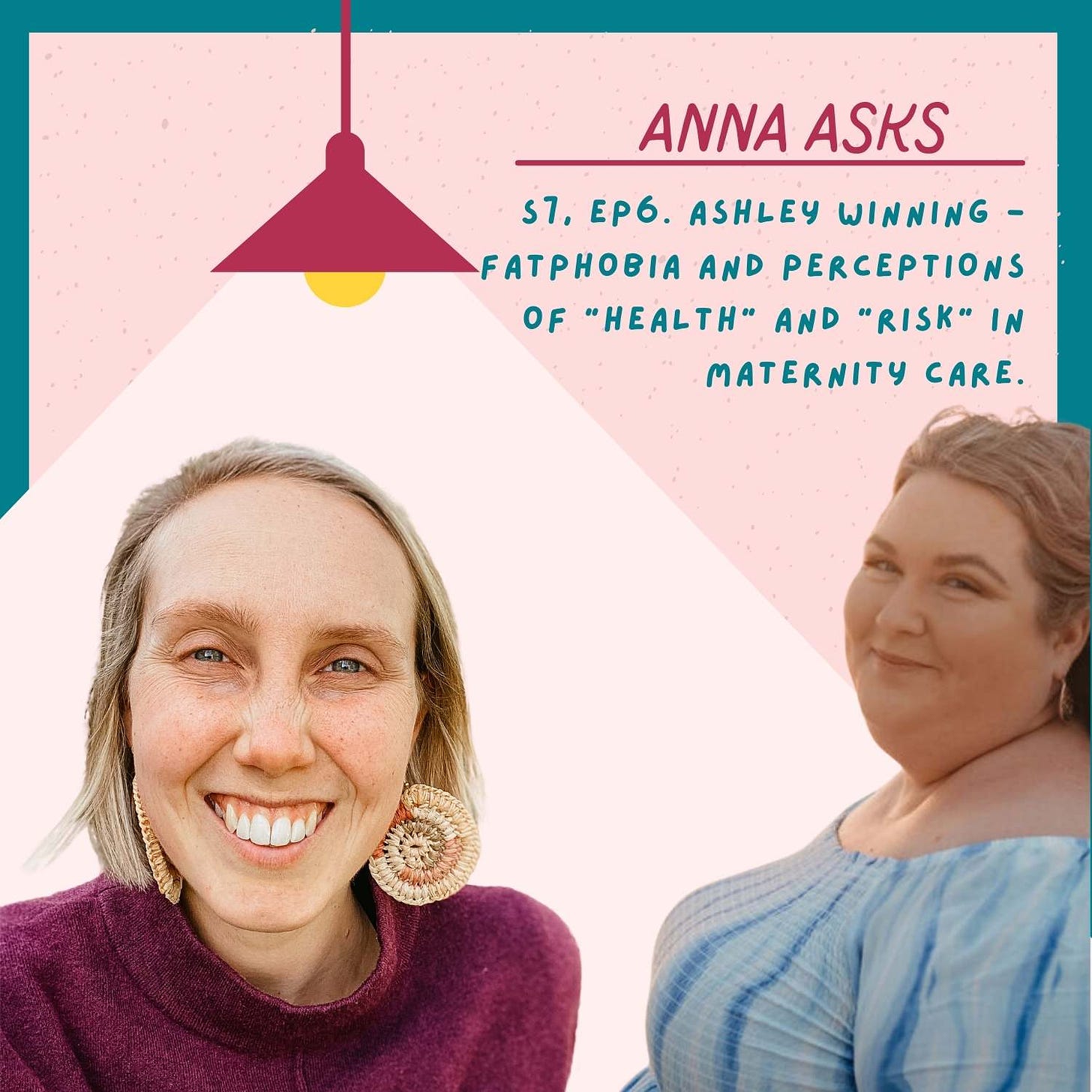Bigger Bodies and Birth: Cutting through the BS to help make the best decisions for you
Anti-fat sentiment is pervasive in all aspects of our society, and is particularly dangerous and harmful in the realm of pregnancy, birth and postnatal care. In the words (1) of size-friendly birth educator Pamela Vireday,
“Fat women are tired of being marginalized by the medical community. They tell stories of egregious bias, of being treated as less than human. They also tell stories of subtle bias, of providers who seem to be size-friendly but ultimately are not.”
In this week’s newsletter I will providing readers with a selection of resources you may find useful if you, someone you love, your clients or patients are embarking on a plus size pregnancy. Below you will find a review of the latest evidence-based book published on the topic, new podcast recommendations and links to a few helpful websites and articles.
Please forward this article on to anyone you think may be interested in accessing these resources.
Book review: ‘Plus Size Pregnancy: what the evidence really says about higher BMI and birth”

“Plus Size Pregnancy” is the latest release from prolific author, researcher, speaker and midwife Dr Sara Wickham. This is the fourth of her books I have read, which if you know me and how picky I am about birth-related resources, says a lot! In this book (her eighteenth!), Wickham guides readers “through the evidence about higher BMI and birth, exposing the myths and assumptions, the broader issues, and the science behind what we do and don’t know.”
As always, Wickham spells out what mothers and parents need to know to make decisions and take actions that are best for them. Her tone is non-judgemental and supportive throughout. Unlike so much of what we hear from “the experts” of maternity care, it is clear Wickham believes that fat women and people are capable, intelligent decision makers, and those with bigger bodies are capable of carrying healthy pregnancies and giving birth.
After a helpful history lesson on weight stigma and the concept of BMI, Wickham offers readers a thoroughly researched, evidence-based and up-to-date resource. The strengths, limitations and findings of recent research studies looking at pregnancy, birth and postnatal care of larger women* and their babies are presented without confusing jargon. Personal stories and narratives are woven throughout which prevents the book becoming dry or, like many other research-heavy books, boring readers to tears.
[*I use the term “women” exclusively here as to the best of my knowledge all included research studies referenced were looking at cis mothers.]
The book is cohesive and flows well, however individual sections would still make sense to readers who need to access information on a specific topic (e.g. antenatal screening and tests) quickly. I appreciated information regarding the ways and circumstances in which being larger can actually be a benefit for mother and baby (yes, they exist!).
A number of suggestions and scripts are offered on how to communicate with and advocate for yourself when interacting with care providers. I would encourage all mothers, parents, doulas and supporters alike to become familiar with these, and practice adapting them as needed. It would be brilliant if medical staff would read this book too and upskill themselves in size-friendly practice, but also, the likelihood of this happening is pretty low, which makes it even more important for the rest of us out there in birth world to read it!
One thing I will note is that Wickham is UK-based and although much of what she says is useful to expecting plus size women and people in Australia and other countries, difference in the structure of the health systems means not every suggestion will be possible to implement. In England, every woman and person giving birth has the right to plan a publicly-funded homebirth with midwives in attendance, and this is one way suggested to minimise unwanted interference with the birth. Whether their trust (kind of like our Local Health District) actively supports that or not is another matter, but everyone in theory has that option. In Australia, although they are now experiencing a minor resurgence, publicly funded homebirth rights and continuity midwifery access have been largely stripped. It is now both a postcode lottery AND a requirement to have a certain pre-pregnancy BMI to have public-funded homebirth access. Some privately practicing midwives may take on plus size clients dependent on their medical and birth history, but this can be expensive and support is not guaranteed due to red tape and perceived risk on the part of their insurer.
This doesn’t mean the book is suddenly useless, but serves as a reminder that all decisions and actions related to birth occur with reference to context, not independent from it. A word of warning also to trans readers that the book is pretty heavy on the “woman/women/mother/she/her” talk, and you might want to seek an alternate resource if you predict this might be troublesome for you.
If you would like to read more about Plus Size Pregnancy, you can do so here on the author’s website. It is available worldwide in papareback form, but if you need it ASAP, you can also download it to your eReader or Kindle. Don’t stress if you don’t have a specific device, you can download the free Kindle or Rabuten Kobo apps then purchase the eBook online for immediate download.
Podcasts
-
If you would prefer to listen to Dr Wickham speak on the topic before diving into the book, you can listen to her being interviewed on the Midwives’ Cauldron podcast here. This interview was released in September 2023. The intro is pretty long, and the interview starts at the 4 minute mark if you’d like to skip forward.
-
My own podcast - Anna Asks. This month’s episode is an interview with Ashley Winning. The episode is titled “Fatphobia and perceptions of ‘health’ and ‘risk’ in maternity care”. From the show notes:
Ashley Winning is a birth and postpartum professional from QLD, Australia. Ashley experienced size-based discrimination in her first two traumatic pregnancy and birth experiences, which led her to dive deeply into the world of physiological birth for her third birth. Again, size-based discrimination struck and she was unable to access the home-based midwifery care she desired. Ashley went on to freebirth her baby and wants others to know this option is available to them too.

-
Turns out great minds do think alike! The same week as I published my interview with Ashley, my postpartum doula mentor Julia Jones released an episode titled “Supporting plus size pregnancy in a fatphobic world^”. In this episode of the Newborn Mothers podcast, Julia interviews another previous guest of mine, plus size mother and postpartum doula Stephanie O’Brien. From the show notes:
We discuss why BMI shouldn’t be used as a sole indicator of health, what it’s like navigating the hospital system as a plus-size woman, and how Steph’s personal experience led her to become a postpartum doula. We explore how postpartum care providers can better support plus-size women.
[The ^ above indicates that this is an affiliate link to Julia’s site. If you’re not interested in becoming a postpartum doula, it will mean nothing to you. If you are, it will mean that if you sign up for her Newborn Mothers Postpartum Education and Care Professional training course after using my link, I will receive an affiliate payment as your referrer. Don’t worry, it won’t change the cost of your course. You can read more about the training program (which myself, Ashley and Steph can all vouch for) using this link, which is also an affiliate link.]
-
Keeping in our little incestuous theme here, both Steph and Ashley host their own podcasts. Ashley hosts the VBAC Homebirth Stories podcast and Steph hosts the Postpartum Stories with Steph podcast.
-
The Plus Mommy Podcast with Jen McLellan. This is a size-specific podcast, that is US-based. I haven’t listened to many episodes yet, but this one with Health At Every Size and weight stigma expert Ragen Chastain discussing the truth diet and weight loss drugs is a goodie.
Helpful Articles for Medical and Support Professionals
-
Do you run birth classes or any other type of event, support plus size women and parents pre-, intra- or postnatally? If you don’t usually, you never know when they might come knocking on your door! This article from Pamela Vireday titled “Welcoming All Families Series: Welcoming People of Size In Your Birth Classes” is worth reading. Despite the name it covers so much more than birth classes, including breastfeeding, pregnancy clothing and links to plus size positive resources and images. There are so many links in the post to useful resources, and I’d encourage you to view them directly rather than me copy-pasting or reinventing the wheel here.
-
“Are You a Size-Friendly Midwife?”, again by Pamela Vireday. This article is written with midwives in mind, but is useful for doulas and supporters too to improve or re-orient their practices related to pregnant women and clients of size. It is a 2002 article, but unfortunately much of it is still relevant now. Warning: this is not one to read if you are embarking on a plus size pregnancy!! It may also be triggering if you have experienced medical trauma, birth trauma and/or obstetric or sexual violence, so please take care.
Categories
- News (33)
- Breastfeeding (22)
- Post-partum (69)
- Sleep (14)
- Food (7)
- Partners (19)
- Rehab (2)
- Parenting (51)
- Birth (21)
- Pandemic (14)
- Research Update (5)
- Decolonisation (2)
- Covid (14)
- Education (8)
- Motherhood (43)
- vaccines (2)
- Children (9)
- self employed (2)
- government policy (3)
- feminism (10)
- abortion (3)
- lockdown (3)
- infancy (1)
- gentle parenting (10)
- infertility (1)
- parenthood (9)
- isolation (2)
- village (5)
- Pregnancy (7)
- Podcast (2)
- Mental Health (5)
- Career (2)
- Mental Load (1)
- Community (1)
- Technology (1)
- Doula (2)
0 comments
Leave a comment
Please log in or register to post a comment